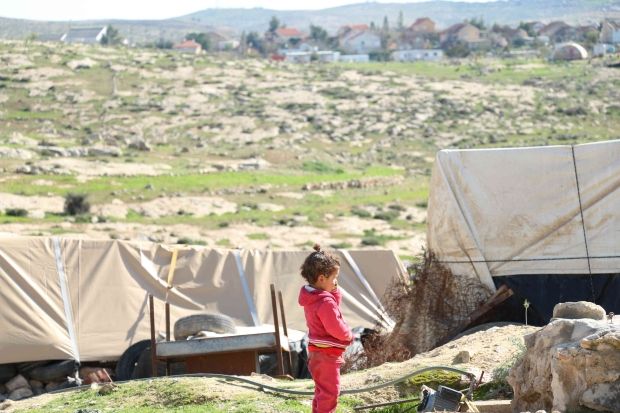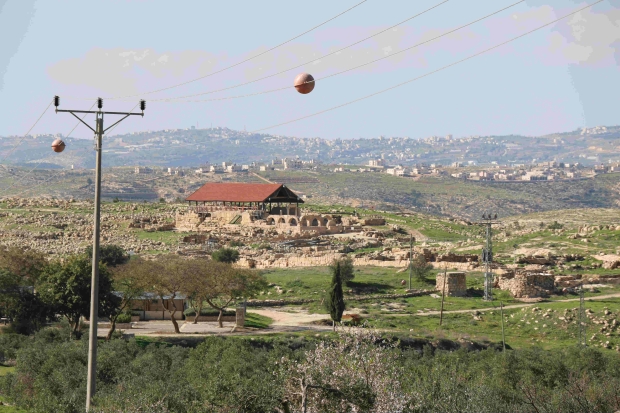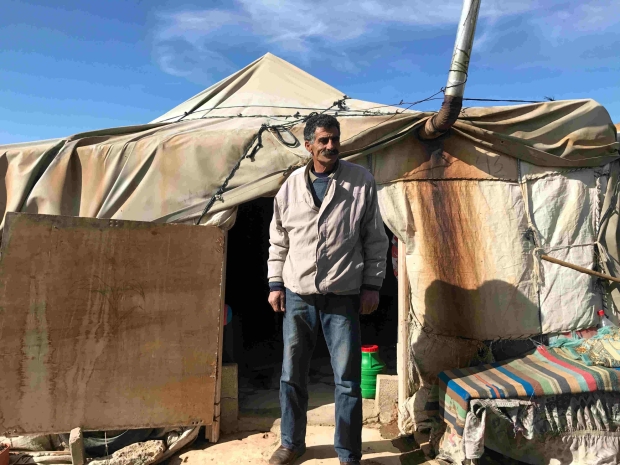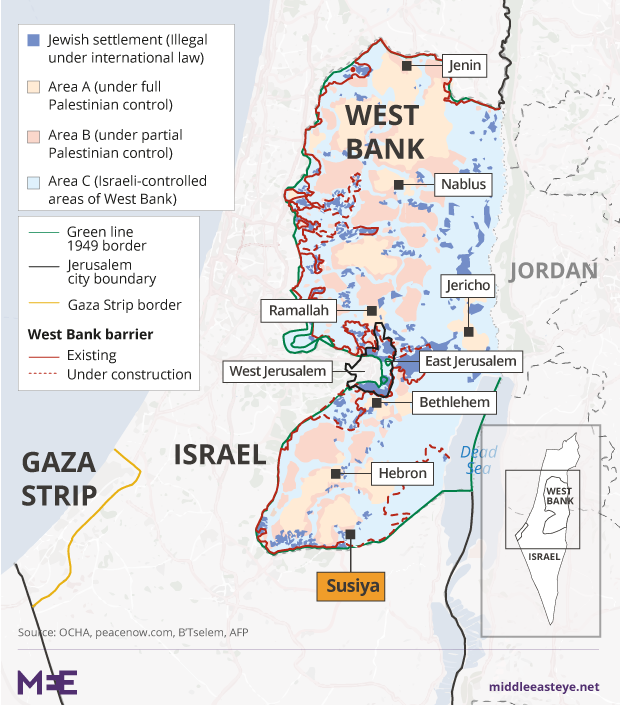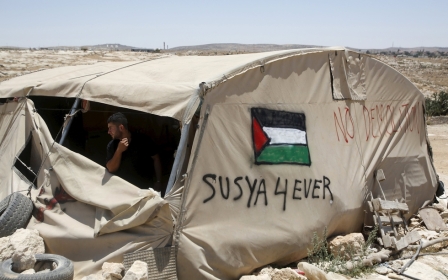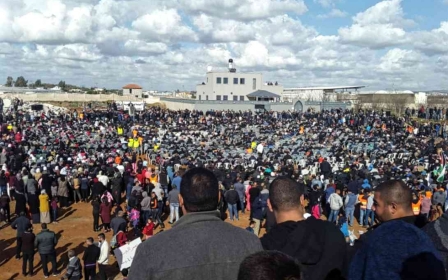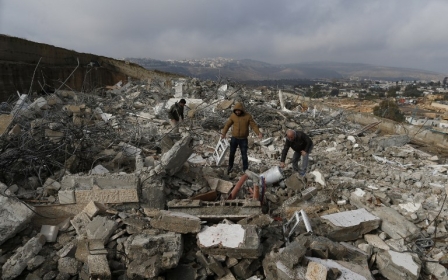Decades-long battle continues, as Susiya braces for more Israeli demolitions
SUSIYA, Occupied West Bank - For the Palestinian villagers of Susiya, a small herding community of around 350 people tucked into the south Hebron hills, daily existence is marred by the unsettling reality that, at any moment, their entire livelihood might be bulldozed to the ground.
"Every day we wait; we wait for the Israeli bulldozers to come," Jihad Nawajaa, 49, the head of the local village council, told Middle East Eye as he sat outside a tent in the centre of the village, which is composed of dozens of tents and agriculture structures sprawled across an area of around 500 dunums (50 hectares).
"Can you imagine the psychological effects this has on the people, on the children, who are always wondering when the next demolition order or settler attack will come?"
The latest demolition order to be handed down to the residents of Susiya, who have been embroiled in legal battles with the Israeli state for decades, came on 1 February, when the Israeli High Court gave the government a green light to move forward with the demolition of seven structures housing 42 people, half of them children.
The move came despite widespread condemnation from British MPs and international activists. The latter maintain an almost constant presence in the village to assist villagers in the event of attacks from Israeli settlers or forces.
"More than 40 people, most of them children, will be made homeless in the freezing winter rain and wind," Nawajaa said. "We cannot let this happen."
Now Nawajaa, along with the rest of the village council, has put out a call to international activists for emergency action in what they are calling a "last-ditch effort" to save their homes.
In a statement released earlier this week, the village council insisted that demolishing Susiya would be a war crime, and quoted British Labour MP Stephen Kinnock, who said in a recent speech to Parliament: "This is not an issue of Arab, Muslim or Jewish people. It is about upholding our basic values of justice and human rights, and it is about holding to account those states, governments and duty bearers that violate those principles and laws."
Decades of demolitions and threats of displacement
While the looming threat of demolition has grown stronger in recent weeks, the story of Susiya and the people's fight for their land dates back more than 30 years.
According to Israeli human rights NGO B’Tselem, the village of Susiya can be found on maps dating back to 1917, decades before the state of Israel was created in 1948.
The original land of Susiya spanned about 300 hectares and belonged to some 26 families living in caves.
In 1986, the Palestinians of Susiya were expelled from their homes to nearby lands, after Israel designated the area an archaeological site, following the discovery of ruins of an ancient Jewish synagogue.
Responsibility for the site was turned over to the Jewish settlers from the nearby illegal "Sussiya" settlement, which was built on the village’s lands in 1983. All settlements in the West Bank are deemed illegal under international law.
In 2001, the Israeli army, with the help of settlers, destroyed the entire village after Palestinians (not from Susiya) killed an Israeli settler from the neighbouring settlement.
The residents have tried on numerous occasions to get building permission from Israel's Civil Administration, but like most of those from Palestinians living in Area C their requests were denied.
In 2012, the villagers commissioned a master plan in the hope of creating a more stable living environment, only to have that plan rejected as well.
Can you imagine the psychological effects this has on the people, on the children? Who are always wondering when the next demolition order or settler attack will come
- Jihad Nawajaa, head of Susiya village council
Since then, all new construction of houses and vital water and electric infrastructure, as well as essential repairs to the fragile tents the villagers use as homes, has been banned.
"We have not built anything new on the land since then," Nawajaa told MEE, insisting though that, even so, it is their land and they should have the right to build on it.
"All that has happened is we changed the covers of our tents occasionally over the years because of the wear and tear from the harsh climate, Nawajaa said.
"When some of the people changed the covers of their tents, they changed the colours from black to white because that was what was available to us. After this, the Israeli authorities came and said we had built new houses."
Including the seven homes under imminent threat, Israel has plans to destroy some 20 houses, equivalent to one-fifth of the entire village.
According to Nawajaa, in the next six months the court can decide at any moment, like it did earlier this month, to move forward with the rest of the demolitions.
'We are not alone in this fight'
Azzam Nawajaa, also known as Abu Murad, 56, was one of those informed that his home will be destroyed this month. He lives in a small tent, set up before 2012, with his family of six.
Abu Murad, like most of the Palestinians in Susiya, admits that life in the village under Israeli occupation is not easy.
"Here in Susiya, we suffer under the constant threats of the Israeli occupation," Abu Murad told MEE, "but we are not alone in this fight." He highlighted the cases of several Palestinian villages throughout the West Bank and East Jerusalem, such as Khan al-Ahmar, Abu Nuwwar, Silwan, and many others that are also under threat of demolition by the Israeli state.
"They have tried to present this to us as a generous offer, but it is not even their land to give to us," Abu Murad said, pointing out that the land in question in Yatta already belongs to Palestinians from that town.
"Our rights to this land are not only written in the centuries-old deeds that we have proving our ownership of the land, but they are also enshrined in international law," he said. "Yet Israel continues to ignore these laws for the sake of expanding their illegal settlements."
How do you think we feel? When the people that are trying to kick us off our land come and ask if we are happy. Do they think we are happy that they will destroy our homes?
- Abu Murad, resident
Earlier that morning, Israeli authorities had come to take pictures of Abu Murad's home and the six other homes set to be demolished later in February.
"They came to taunt us, asking us 'How are you doing? Are you happy?'," Abu Murad said.
"How do you think we feel? When the people that are trying to kick us off our land come and ask if we are happy. Do they think we are happy that they will destroy our homes?"When asked what his family's plan is in the event that they do lose their home, Abu Murad chuckled, and sat back in his chair.
"For 30 years, we have been moved around from place to place. First they came for my village, now, they have come for my house. Do you think, after all these years, I will let them destroy my house and give up my rights?" he asked.
"The answer is no, there is no alternative plan or option, because I will stay here on my land no matter what."
New MEE newsletter: Jerusalem Dispatch
Sign up to get the latest insights and analysis on Israel-Palestine, alongside Turkey Unpacked and other MEE newsletters
Middle East Eye delivers independent and unrivalled coverage and analysis of the Middle East, North Africa and beyond. To learn more about republishing this content and the associated fees, please fill out this form. More about MEE can be found here.


